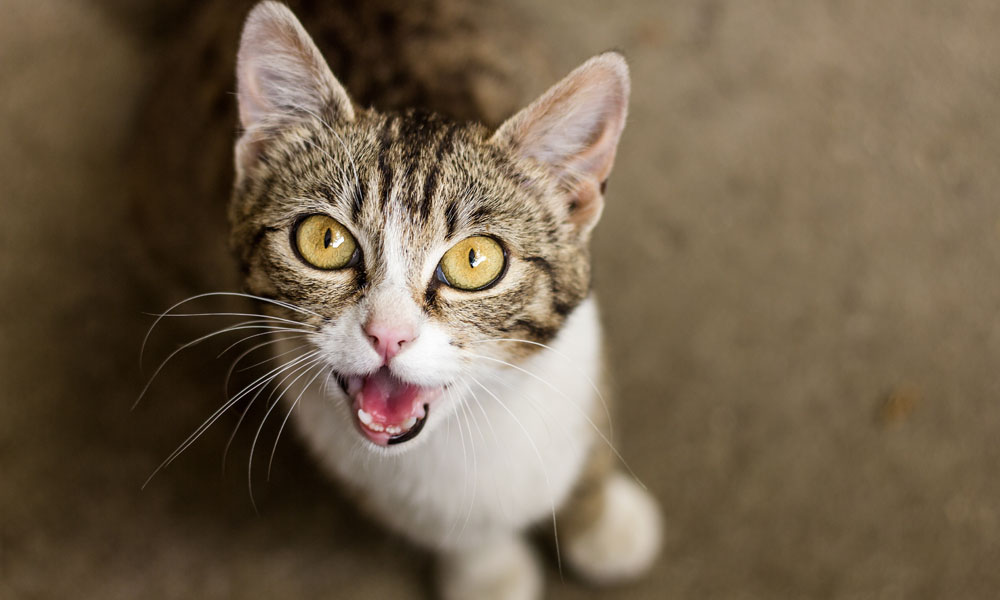Your cat is staring at the bathroom faucet, would like a head scratch, or wants to be let in from outside — any of these things can set off the chorus of meowing.
Most pet parents find these meows cute and endearing. But sometimes, cats can get excessive with their meows, and that can get annoying, especially if you’re trying to sleep, enjoy your show or carry on a conversation.
So why do cats meow in the first place? Cats meow to communicate, but it’s usually limited to kitten-to-cat or cat-to-human interactions. When cats communicate with each other, they prefer non-meowing means. Instead, they’ll deploy body language and scent, facial expressions, along with yowling, growling, chirps and hisses.
But at some point in their history with humans, felines discovered when they need something, the people will respond if they just let their needs be known with a meow. For a fascinating deep dive into how cats communicate through sound, visit Raising Your Paws podcast episode No. 39, and scroll to find the blog “What Are Cats Saying?”
Here’s a look at some of the top reasons why they behave this way, and what you can do about it.
Nighttime pestering
When kitty makes nighttime visits when you’re trying to get some shuteye, meowing at your head all the while, you probably have a bored cat on your hands. As cats are nocturnal, nighttime activity is to be expected. Still, there are some things you can do to take the attention off of you.
- Ramp up the play sessions. Giving your energetic cat an extra vigorous play session sometime before you turn in for the night is a great way to take the edge off, so you can get some rest.
- Add enrichment. Cats are by nature curious and active creatures, and we can underestimate how much stimulation they need to live happy lives, especially if they’re living indoors full-time. Before bedtime, set out a new empty box and paper bag for kitty to play with, along with plenty of toys. Consider investing in a sturdy cat wheel so they can have a place to run at night.
- Time for a friend? If cats bond with each other, they can keep each other company. If yours is an only cat, look into adopting a friend. Keep in mind, not all cats get along, so make sure you do your homework before you introduce another cat to your household.
- Refrain from responding. Ignoring your cat’s 3 a.m. pleas for attention won’t be a quick fix. Phasing out the behavior will be a gradual process that requires patience. But giving in will reinforce the behavior you do not want. Whatever you do, do not interact with the cat during a time when you’d rather be sleeping.
What to do when your cat meows constantly for food
If kitty is constantly pestering you over her empty bowl, it may be time to rethink her mealtimes.
- Consider more frequent meals. Some cats are happier with 4-6 smaller meals a day, rather than one to two larger ones. To keep your cat from overeating and putting on excess pounds, make sure the cat is getting portions that don’t exceed your cat’s daily calorie count.
- Invest in an automatic feeder. For pet parents who have suffered through too many early-morning wake-up calls, technology can be a life saver. Just set it for a time that’s slightly earlier than the typical wake-up call, and you should be on your way to better rest.
Training tips to get your cat to meow less
When your cat approaches you with aggressive demands for attention, stop rewarding the behavior. This may be a part of your communication system, but it’s important to stop rewarding your cat by talking back, or giving him a head scratch, or performing the action he wants. When your cat meows:
- Ignore your cat’s pleas: Don’t look at him, don’t talk to him, don’t touch him.
- Offer a reward: Only when the cat is finally quiet, reward him with a small treat, or the head scratch he’s been asking for.
- Increase the time: Put the ignore, wait, reward cycle into practice, gradually increasing the interval of time between the start of the cat’s silence and granting his reward.
When excess meowing needs your attention
Before you chalk up the excess meowing to a behavior that needs some gentle correction, consider these three things.
- Do a check-in: When the meowing sets off, always check in with kitty to make sure there’s not a legitimate reason behind it. As you know, your cat has different types of meows that can mean different things. Pay attention to the variety in sound so you can learn what your cat may be communicating. (Learn from the other pet parents who discovered that someone accidentally shut kitty in the closet before bedtime, only to ignore their pleas for hours.)
- Rule out injury or illness: When a cat’s in pain, she may be trying to let you know through her meows. If the excessive meowing is recent (and not tied to a regular pattern of pleading for food or wanting to be pet), it’s time for your cat to be examined by their health care provider. Something like an abscess from an old wound could be causing pain, and they’ll need antibiotics to treat it. Also, a medical condition such as thyroid disorder can make cats more vocal.
- Aging: When cats get older, they may experience cognitive dysfunction. In elderly cats, crying out can be a common occurrence at night because when the lights are low, they may become confused or disoriented. Plugging in extra night lights around the house can make the surroundings more familiar to kitty. Medications and other remedies can calm your cat when you’re trying to rest. Check with your feline’s health care professional to discuss your options.
When working with your cat to curb the meowing, keeps some cans of wet food on hand to reward the behavior you want to see. NutriSource comes in delicious flavors like chicken, lamb and fish, and serves up the perfect balance of flavor and nutrition for a happy and healthy cat. Look for NutriSource Canned Cat Food at your local independent pet retailer.


